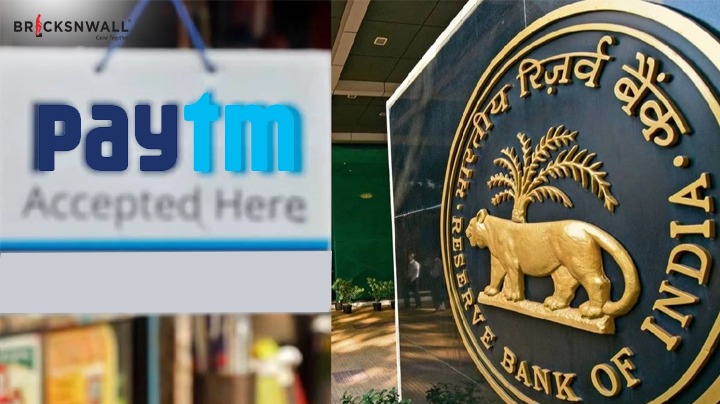RBI Cracks Down on Paytm | Banning Banking Services
Bricksnwall Trusted Experts

The Reserve
Bank of India announced a fairly atypical death sentence for Paytm Payments
Bank on the evening of January 31. It prohibited the bank from engaging in any
kind of banking activity following February 29. This included making deposits,
using credit, topping up wallets, paying bills, and anything else.
Although the
regulator has already taken action against a number of financial institutions,
this particular one felt somewhat definitive. The Reserve Bank of India did not
provide a reprieve for the bank from these tough regulations. The brief press
release had no information suggesting that Paytm Payments Bank would be given a
chance to address its systems or that the RBI would think about loosening
limitations in the event that the problems were resolved.
Industry
insiders are already doubting the seriousness of the regulatory issues that
prompted such an extreme and uncompromising ruling in light of the unusual
step.
Observers of
the sector to gain insight into the sequence of events that culminated in the
bank's eventual shutdown, which appears to have begun less than a year after
Paytm Payments Bank (PPBL) was established more than six years ago. These are
serious infractions that, at the very least, put the bank's clients at danger
of fraud and data breaches. There are even more serious concerns about the
promoters' lack of transparency, which includes, but is not limited to, their
repeated submission of fraudulent compliance reports to the regulator.
First
Strike
A Sequence
of Failures at Paytm Payments Bank, Non-Compliance History, First Strike
The
operations that led to the crackdown began when PPBL first obtained a banking
license in January 2017. Within a year of operations, the bank saw its first
regulatory strike, despite its encouraging start after the demonetisation of
2016. In June 2018, the RBI temporarily stopped accepting new accounts due to
violations of licensing requirements, such as failing to maintain day-end
balances and failing to follow know-your-customer (KYC) regulations.
The
Second Strike
The RBI's
discovery that PPBL had filed fraudulent information in October 2021 dealt the
second blow, prompting the latter to impose a ₹1 crore fine.
"Upon
reviewing PPBL's application for the issuance of the final Certificate of
Authorization (CoA), it was noted that certain information provided by PPBL did
not accurately reflect the situation as it actually was. In a notification on
October 20, 2021, RBI had stated that it had concluded the aforementioned
charge was true and justified the imposition of a monetary penalty.
The
Third Strike
In the
latter half of 2021, further investigations uncovered alarming gaps in
cybersecurity, technology, and KYC anti-money laundering compliance. Sources
claimed that despite these worries, the RBI's assessment found no physical or
server separation between the bank and other One 97 group companies.
Due to this,
the RBI placed supervisory restrictions on PPBL in March 2022, ordering the
bank to immediately cease accepting new clients and to hire an outside audit
company to carry out a thorough system assessment.
"Today,
Reserve Bank of India has instructed Paytm Payments Bank Ltd to cease
onboarding new customers immediately, in accordance with section 35A of the
Banking Regulation Act, 1949, among other powers. Additionally, the bank must
designate an IT audit company to carry out a thorough system audit of its IT
infrastructure. After examining the IT auditors' findings, the RBI must
specifically approve Paytm Payments Bank Ltd.'s onboarding of new clients.
This measure stems from specific significant supervisory issues that have been
noticed within the bank, the RBI stated in a notification dated March 11, 2022.
Round
Four
When the
system auditor's report became public in the latter half of 2022, the RBI
discovered that the bank had not taken any significant steps to implement the
required corrective actions.
By October
2023, PPBL had received a fourth strike against them when the RBI levied a
₹5.39 crore financial penalty for continuing to violate KYC regulations. Among
other issues, the regulator pointed to shortcomings in the video-based customer
identification procedure (V-CIP), identification of beneficial owners,
monitoring of payout transactions, exceeding regulatory ceilings, and delayed
reporting of cybersecurity breaches.
Risks
of money laundering, digital fraud, and serious KYC AML infractions
According to
someone with firsthand knowledge of the situation, "there are major
irregularities in KYC, which expose the customers, depositors, and wallet
holders to serious risk." According to the source, these included several
consumers not having KYC, going into thousands, and PAN validation errors in
lakhs of accounts.
The RBI
discovered that the same PAN was associated with over 100 consumers in
thousands of cases, and with over 1,000 customers in some circumstances. The
insider further stated that the overall value of transactions in certain
accounts exceeded regulatory thresholds for minimum KYC pre-paid instruments by
crores of rupees, raising worries about money laundering.
Promoter
lack of transparency
The
regulator's worries about the PPBL were heightened by the bank's promoters'
record of non-transparency, which made the situation worse. "The
compliance that the bank submitted was discovered to be false upon verification
on multiple occasions, by both the RBI supervisors and external auditors,"
the individual with knowledge stated.
The RBI
noted that Paytm Payments Bank's sizable payables to its parent company OCL
were frequently omitted from the bank's financial filings. The individual who
was previously quoted said, "Agreements were often being revised to
benefit the OCL or its group companies, and apparently detrimental to the bank
and its clients."
Additionally,
the regulator discovered a remarkably high quantity of inactive accounts, which
are likely to have been exploited as mule accounts. According to a second
source with direct knowledge, the RBI discovered that up to 31 crore of the
approximately 35 crore wallet accounts that Paytm keeps are inactive.
The bank's
absence of a transaction monitoring system and shortcomings in its KYC
procedures raised worries about money laundering as well. For example, it was
discovered that thousands of cases had their wallets and accounts frozen by
different law enforcement agencies nationwide because the accounts were used to
perpetrate digital crimes.
Arm's
distance from Promoter Group Entities is not upheld
The RBI's
discovery that the group's financial and non-financial operations were being
mixed with those of its promoter group companies in violation of RBI guidelines
and license requirements only served to exacerbate the problem. Data privacy
and sharing concerns were brought up by the PPBL's reliance on the IT
infrastructure of One 97 Communications Limited (OCL), its parent company.
What's
Next
"The
bigger issue is Paytm has not been on the good books of the regulator and going
forward, their lending partners also could possibly re-look at the
relationships," as Macquarie put it. Analysts have already been informed
by management that the company would not be making any new loan originations
for the next few weeks until it addresses the current problem.
Although
Paytm cannot make loans to consumers because it is a payments bank, it does
collaborate with other financial institutions that can make loans in order to
generate income from those loans. These banking relationships, which are
frequently built on trust, can suffer if lenders decide to deal with a player
who is under regulatory scrutiny more cautiously.
3.93 crore merchants used Paytm as of the end of December 2023. It gives them the option to collect payments via QR codes or to use Paytm Soundboxes, which notify businesses when payments are received and are connected to their bank accounts. Numerous of these retailers have Paytm Payments Bank bank accounts. The deadline for Paytm to transfer all of these QR codes to additional sponsored banks is February 29.




